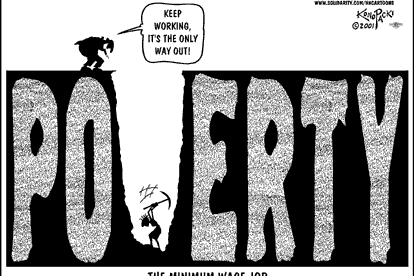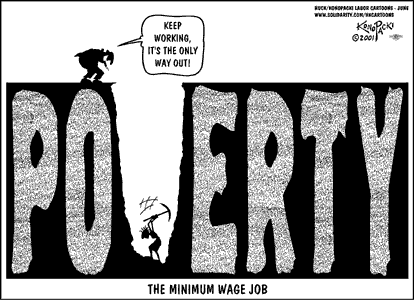Should We Raise the Minimum Wage?

 Currently, the federal minimum wage is $7.25 an hour. The average minimum wage earner (working a 40 hour week) makes approximately $15,080 a year before taxes. That is barely enough for a single person to live on in even the cheapest parts of the country. A family certainly wouldn’t be able to live on that, yet 21% of minimum wage employees are the sole wage earners of their families. For this reason, many argue the minimum wage should be raised to allow single wage earners to keep their families above the poverty line, while others argue that raising the minimum wage will only hurt the economy and drive many people even further into poverty.
Currently, the federal minimum wage is $7.25 an hour. The average minimum wage earner (working a 40 hour week) makes approximately $15,080 a year before taxes. That is barely enough for a single person to live on in even the cheapest parts of the country. A family certainly wouldn’t be able to live on that, yet 21% of minimum wage employees are the sole wage earners of their families. For this reason, many argue the minimum wage should be raised to allow single wage earners to keep their families above the poverty line, while others argue that raising the minimum wage will only hurt the economy and drive many people even further into poverty.
The argument for raising the minimum wage is simple: people need to make enough money to live off of. Keeping the minimum wage where it is at perpetuates a cycle of poverty that is almost impossible to break out of. Advocates also claim that raising the minimum wage would boost the economy by providing people with enough money to reinvest in the economy. They argue that raising the minimum wage would help businesses in the long run by preventing high employee turnover and saving money on employee retention and lower retraining costs.
Opponents of raising the minimum wage explain that it might not be that simple. The economic consequences of raising the minimum wage might be so great as to make the action more detrimental than it might appear to be at first glance. They argue that a hike in minimum wage would actually hurt those we are trying to help by reducing employment. Minimum wage laws say that if you hire someone you must pay them a certain wage. But they do not require that you hire anyone at all, much less that you keep the same people on your payroll. In the end, they argue, raising the minimum wage could actually increase poverty because there will be fewer jobs and less demand for labor.
These are both viable arguments. It is plausible that having everyone make a little less money is the better than the possibility that some could be making nothing. But try telling that to all of the people who are currently living in poverty because the minimum wage is not enough to live on in today’s society. In order to craft a solution to the minimum wage debate, we have to find a middle ground in which each side can win a little.
One possible solution would be to raise the minimum for full-time “adult” workers only, but still allow employers to hire teenagers, students, and part-time workers at a lower minimum wage. This would accomplish the goals that a minimum wage hike is designed to achieve while also avoiding the degree of layoffs that opponents fear could happen with a universal minimum wage hike. Of course, as in any system, there are inherent problems, including how to how to prevent a situation in which employers choose to hire only teenagers or part-time workers, and in doing so leave older, presumably more experienced, workers without employment. But the legislature can certainly find a way to overcome these problems, and such a system has the potential to produce a lot of benefit without also bringing significant harm.
But there should also be more fundamental changes if we want to create any kind of lasting solution to the problem. Many people are only making minimum wage because they do not have the skills or the productivity that our economy and employers value. The best solution to this is education. It is no secret that our public education system is less than ideal and is leaving graduates without the skills needed for well-paying jobs. Moreover, as we know, higher education is expensive. Those who are barely making enough to support themselves cannot afford to forgo several years of work to get an education, much less afford the hefty cost it entails. But these are problems that can be fixed, and they are worth focusing on because they could lead to real, lasting changes.
A universal minimum wage hike is not the clear-cut, obvious answer to the problem that many Americans are facing. Something needs to be done, that much is clear, but raising the minimum wage could bring with it many drawbacks that individuals and our economy are unprepared to combat. The answer lies in crafting creative solutions that will indirectly lead to a better standard of living for all Americans, not just the lucky few.

I agree that something absolutely needs to be done regarding the minimum wage. Although there is speculation about exactly how an increase in the minimum wage will impact our economy, at least an increase should be tried. After graduating from college, I spent two years working in NYC and my friends and I would constantly discuss how difficult it was to budget living in NYC (food, transportation, constantly increasing rent). I can’t even imagine the pressures of individuals who make minimum wage and have to support families. NYC is one of the most expensive American cities to live in, but as discussed in the post, minimum wage is barely enough for someone to live in even the cheapest cities. Also, moving is expensive and it should not be required that individuals have to move to another city because they can’t afford to live in the one that they want simply because they are receiving minimum wage.
I believe that education is a crucial part of solving the problem. By making education more affordable, then more people will be able to go to school to obtain the skills necessary for getting jobs that pay more. Perhaps the federal government can offer incentives for companies that pay higher than the minimum wage. Perhaps companies can offer to subsidize some of the cost of education if the workers promise to work a certain amount of time after graduating. Perhaps the federal government can make education more affordable (although this is a difficult task, it will lead to a better future where more people have the opportunity to go to school). I like the idea of a minimum wage increase for full time “adult” workers because it at least it allows some people to make more money. Although some might argue this is discriminating against, I think that society would understand that typically adults are the ones that have families to support and deserve to make slightly more money. The difference does not have to be a substantial amount. At this point, any increase in the minimum wage will make an impact to some extent. Unfortunately, I do not know of the solution that will work, but it is important to at least try something. It is not fair for people to not have the means for basic needs. Recently, the prices of rents and transportation have been increasing. It is only right that wages increase along with these other increase.